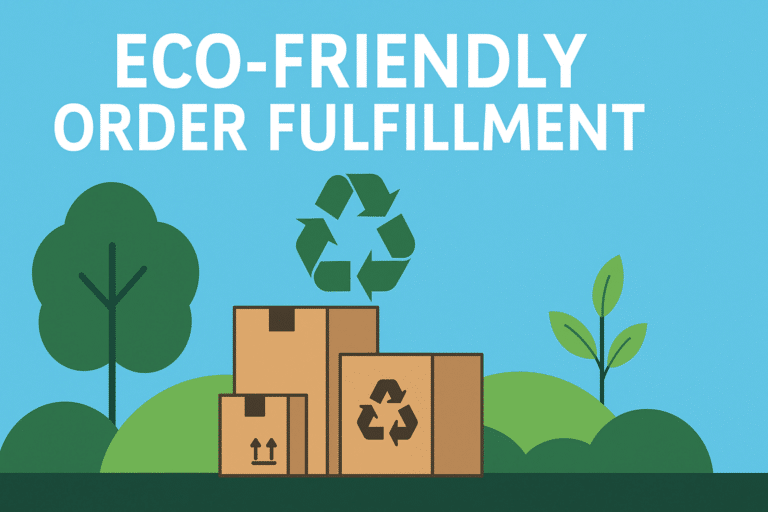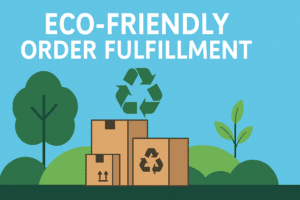Sustainability is no longer just a buzzword. It’s a customer expectation. As environmental awareness continues to grow, consumers are actively seeking out brands that prioritize sustainable business practices. For ecommerce retailers, this shift presents both a challenge and an opportunity: how to meet demand for fast, reliable fulfillment while minimizing environmental impact.
This is where eco-friendly order fulfillment comes into play. From using biodegradable packaging to optimizing delivery routes and reducing warehouse energy consumption, there are numerous ways businesses can lower their carbon footprint without sacrificing efficiency or customer satisfaction.
At ShipBuddies, we recognize the critical role fulfillment plays in a sustainable supply chain. That’s why we’re committed to helping ecommerce businesses adopt smarter, greener logistics practices that align with their environmental goals.
In this article, we’ll explore the importance of sustainable fulfillment, practical strategies to implement it, and how ShipBuddies supports businesses looking to build a cleaner, more responsible fulfillment operation.
The Importance of Sustainable Fulfillment
Sustainable fulfillment is becoming a cornerstone of responsible ecommerce. As the volume of online orders continues to rise, so does the environmental impact of warehousing, packaging, and last-mile delivery. Businesses that prioritize sustainability not only reduce their carbon footprint—they also create long-term value through cost savings, brand loyalty, and competitive differentiation.
Reducing Environmental Impact
Fulfillment operations often involve significant energy use, excess packaging, and emissions from transportation. By adopting eco-friendly practices, companies can directly address these challenges:
- Switching to biodegradable or recyclable materials reduces landfill waste.
- Energy-efficient warehouses lower electricity usage and carbon output.
- Using carbon-neutral or optimized shipping methods cuts down on transportation-related emissions.
Even incremental improvements in fulfillment practices can contribute to a measurable reduction in environmental impact.
Improving Brand Reputation and Customer Loyalty
Today’s consumers—especially Gen Z and millennials—actively support brands that reflect their values. According to a Nielsen report, 73% of global consumers say they would definitely or probably change their consumption habits to reduce environmental impact.
Sustainable fulfillment practices signal to customers that your brand is environmentally conscious and socially responsible. This builds:
- Stronger customer trust
- Higher engagement and loyalty
- Positive word-of-mouth and reviews
It’s more than a trend it’s a powerful factor in how customers choose where to shop.
Driving Cost Savings and Operational Efficiency
Going green doesn’t have to mean higher expenses. In fact, sustainable practices can often result in long-term savings:
- Right-sized packaging reduces material usage and dimensional shipping fees.
- Energy-efficient equipment and lighting can lower utility bills.
- Accurate inventory forecasting helps prevent overstocking and waste.
With thoughtful implementation, eco-friendly fulfillment can benefit both the planet and your bottom line.
As we move forward, we’ll explore key strategies to help ecommerce businesses make their fulfillment processes more sustainable without sacrificing performance or customer experience.
Key Strategies for Eco-Friendly Order Fulfillment
Creating a sustainable fulfillment operation requires more than good intentions. It involves taking actionable steps across every stage of the supply chain—from packaging to transportation to inventory management. Below are several practical strategies that ecommerce businesses can implement to reduce their environmental impact while maintaining operational efficiency.
Sustainable Packaging Solutions
Packaging is one of the most visible areas where ecommerce businesses can go green. Customers notice what their orders arrive in, and excessive or wasteful materials often leave a negative impression. By rethinking packaging practices, you can reduce waste and appeal to environmentally conscious shoppers.
- Use recyclable, biodegradable, or compostable materials wherever possible
- Eliminate unnecessary filler and choose right-sized packaging to minimize waste
- Explore reusable packaging programs for products that support it
- Incorporate minimalistic designs that use fewer resources without compromising protection
These packaging improvements can lead to lower shipping costs and a stronger brand image.
Energy Efficient Warehousing
Warehouses often consume large amounts of energy. Making small changes to how they are operated can significantly improve sustainability.
- Upgrade lighting systems to LED for better energy efficiency
- Use smart HVAC systems to optimize temperature control with less energy use
- Install solar panels or purchase renewable energy credits to reduce reliance on non-renewable power
- Design warehouse layouts that minimize travel distance for workers and equipment
Energy efficiency not only reduces emissions but also cuts down on overhead costs in the long term.
Green Transportation Practices
Shipping is one of the biggest contributors to the environmental footprint of ecommerce. Businesses can make an impact by choosing smarter transportation methods.
- Partner with carriers that offer carbon-neutral shipping options
- Optimize delivery routes using route planning software to reduce fuel consumption
Incorporate electric or hybrid vehicles for last-mile delivery when possible - Consolidate shipments to reduce the number of trips needed
Choosing eco-conscious transportation strategies helps balance customer expectations with environmental responsibility.
Efficient Inventory Management
Poor inventory management leads to waste, overproduction, and unnecessary storage. Sustainable practices in this area can help reduce emissions and material use.
- Use demand forecasting tools to align inventory levels with actual sales trends
- Adopt just-in-time inventory models to minimize unused stock
- Improve order accuracy with reliable picking and packing processes to reduce returns and waste
- Avoid overstocking slow-moving items that consume space and resources
Accurate inventory management plays a key role in reducing both environmental impact and operational costs.
Reverse Logistics and Recycling Programs
Returns are a natural part of ecommerce, but they can generate significant waste. Reverse logistics programs that prioritize reuse and recycling can help close the loop.
- Make it easy for customers to return products in a way that supports reuse or recycling
- Partner with local recycling providers to responsibly process returned goods
- Encourage customers to recycle packaging materials with clear labeling and guidance
- Offer incentives for customers who participate in take-back or recycling initiatives
Well-managed reverse logistics programs reduce landfill contributions and give products and materials a second life.
Building a Greener Future Through Smarter Fulfillment
Eco-friendly order fulfillment is no longer optional for businesses that want to stay competitive—it’s an essential part of operating responsibly in today’s ecommerce landscape. From reducing packaging waste and energy consumption to embracing green shipping practices and efficient inventory management, every step toward sustainability matters.
Implementing these strategies doesn’t just benefit the environment. It also strengthens your brand reputation, earns customer trust, and can even lead to long-term cost savings. Customers are paying attention to how products are made, packaged, and delivered—and they’re more likely to support businesses that align with their values.
At ShipBuddies, we believe sustainability and efficiency go hand in hand. Whether you’re just beginning to explore eco-conscious fulfillment or ready to take your green initiatives further, our team is here to help you make it happen.
Ready to create a more sustainable supply chain? Explore our fulfillment services or get in touch with ShipBuddies to learn how we can support your journey toward responsible, scalable ecommerce fulfillment.









